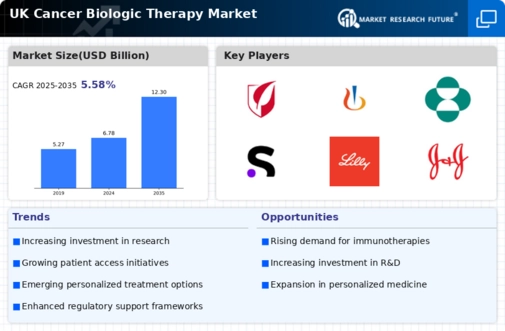The UK Cancer Biologic Therapy Market is a rapidly evolving sector characterized by significant competition and innovation, as various companies strive to develop effective treatments designed to combat different types of cancer. With an increasing emphasis on precision medicine and individualized treatment approaches, the competitive landscape is shaped by ongoing research and development efforts aimed at discovering novel biologic therapies that improve patient outcomes.
Companies in this market are focusing on several key areas, including immunotherapy, targeted therapy, and combination therapy, as they seek to harness the immune system and genetic understanding of cancer for better treatment options. The strategic alliances, partnerships, and collaborations among various stakeholders pave the way for advancements, fueling market growth and enhancing the therapeutic landscape in the UK.Gilead Sciences has established itself as a prominent player in the UK Cancer Biologic Therapy Market, with a strong focus on developing innovative therapies for hematologic malignancies and solid tumors.
The company’s presence in the UK is bolstered by its robust product pipeline and commitment to research initiatives that address unmet medical needs in cancer care. Gilead's strengths lie in its well-established distribution networks, deep understanding of the local healthcare landscape, and partnerships with leading research institutions, which facilitate the execution of clinical trials and the introduction of new therapies to the market.
Their emphasis on patient access and support programs also demonstrates Gilead's dedication to improving treatment experiences and outcomes for cancer patients across the UK.Novartis is another key contributor to the UK Cancer Biologic Therapy Market, renowned for its diverse portfolio of oncology products and a strong research foundation.
The company's offerings include leading biologic therapies that target various cancer types, demonstrating effectiveness in enhancing patient survival rates. Novartis has made significant investments in advancing its pipeline, with a keen focus on CAR-T cell therapies and other innovative solutions, which have positioned it favorably within the market. Furthermore, Novartis has engaged in several strategic mergers and acquisitions that have expanded its capabilities and market reach in the UK.
These initiatives, alongside a strong commitment to health technology assessment and patient-centered care, underpin Novartis's competitive strength as it continues to pave the way for cutting-edge cancer treatments tailored to the unique needs of patients in the UK.
























